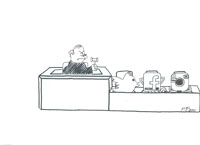When the Founding Fathers drafted the Constitution and wrote the First Amendment, they did not imagine that hundreds of years later, teenagers would be able to communicate and share their thoughts using social media in a matter of seconds.
Being a revolutionary medium of communication, the internet has allowed more people to share their thoughts and opinions, which means that the excessive use of free speech has resulted in new questions about what is guaranteed under the First Amendment. The rapid increase of interest in social media has created According to R.S. vs. Minnewaska Area School District’s court case on the First Amendment Center Organization’s website, “public school officials can punish students for off-campus, online speech only if the speech constitutes a true threat or pose[s] a substantial disruptive effect.” So schools simply cannot punish students for “inappropriate” online speech.
“We generally have a rule of thumb when it comes to social media problems,” Melissa Pikul, dean of students, said. “Things posted online are brought to school in wide varieties, and if the post has any potential to hurt someone physically or emotionally, there will be a warning. If the behavior is continued on Facebook, Twitter, or any other site, there will be consequences, such as an after school detention or suspension. I understand freedom of speech is important and you have the right to post what you believe in or want to say, but even if you are not at school and at your house one Friday night and post a ‘funny’ picture of someone, that ‘funny’ picture can easily be brought to school to talk about. That picture can be a problem because it can make the student uncomfortable and it’s our job to create a safe environment here.”
Regarding the school’s principles involving online speech, Michael Savio, senior and Law Club officer, said he thinks they are appropriate to ensure a safe environment for students.
“Teens can say whatever they want or post whatever they want,” Savio said. “They have the right guaranteed in the First Amendment and are protected under it unless what they’ve said or posted has taken away the freedoms of another. Once you cross the line of restricting others freedoms, I believe the school should get involved.”
With online speech, however, there is not a distinct line between inappropriate and disruptive or threatening language.
“There’s a blurry line between inappropriate and disruptive language. Everything we deal with in the deans’ office is grey, there is no black and white. But if there’s multiple students talking about the post online and it is negatively impacting others, there will be consequences. Some students think that [Chad] Beaver, [dean of students], and I have fake Facebook accounts to catch students. That’s not true. We don’t look for [inappropriate language] online. We trust students and they have the freedom and we can’t judge about their inappropriate posts. But once is affects the school environment and is brought to our attention, we have to deal with it.”
Considering the problems concerning social media at LZ, Pikul said she thinks most students are mature and understand the consequences. Reflecting on the three years Pikul has been here, she said she has never seen someone being horribly defamed on Facebook or any other social media site to a point where he or she ended up transferring schools, which has happened at other high schools.
“It’s horrible hearing other high schools having issues with dangerous threats, drug problems, gang problems, or suicidal threats due to social media,” Pikul said. “We deal with stuff related to social media once a week, but it has never been nearly as bad as the stuff you hear on the news. The kids here are mature and invested in their academics and can’t afford punishment. Also, I am pretty impressed about the amount of students who report problems or potential issues to us and watch out for their friends.”
Being involved in social media, Savio said he thinks students at our school are generally sensible when posting comments on social networking sites.
“Comparatively, our school does not have as many problems concerning social media. I only follow upperclassmen, but I don’t see much harmful stuff,” Savio said. “I do see arguments between people or friends, but I haven’t seen harmful language or bullying. But students can get too comfortable behind a keyboard, and they should keep in mind how other people can interpret what they post. I can sarcastically post something, and someone else can read it in a different or negative tone. Our generation may think bullying does not occur as much because there are no physical fights or conflicts. Social media has created a new form of bullying that can harm someone psychologically and emotionally. But social media, just another form of communication, also has its benefits and allows our generation to be heard.”

